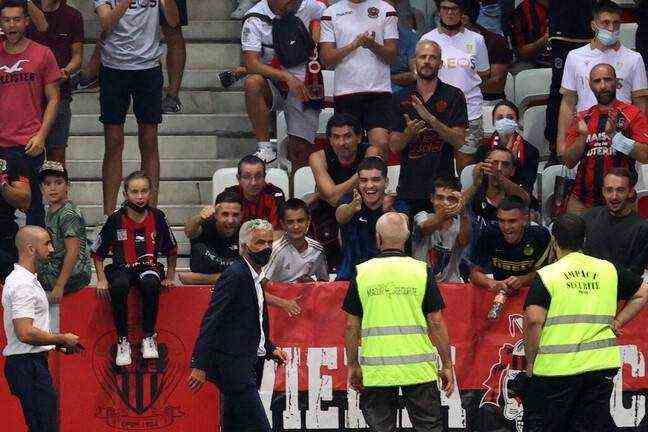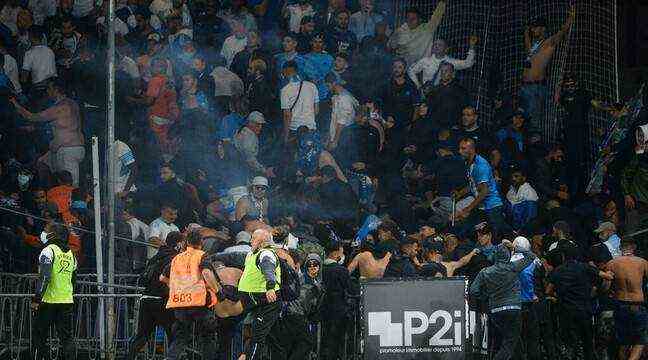Would we live a remake of Groundhog Day? Since the start of the season, after having cursed so much behind closed doors and prayed for the return of the public to the stadiums, not a day of the championship has gone without excesses between supporters making the headlines. The most recent, an Angers-OM which, however, did not have much bloody on paper. This did not prevent the supporters of the two camps from insulting each other from a distance, from sending projectiles into the dark and pushing some Marseille ultras to invade the field to play fist with the camp opposite.
After Nice-OM and Lens-Lille, this match at Raymond-Kopa is the third which has been the scene of an invasion of the field since the start of the season, pushing some voices to demand the outright end of supporters’ travel. . Are we so helpless that we must blindly sanction most supporters for the shameful actions of a handful of them?
As a preamble, remember that if the chain of excesses in Ligue 1 in recent weeks could lead us to think that the problem only concerns our country, these acts of violence are “absolutely not a Franco-French phenomenon”, underlines Nicolas Hourcade, sociologist at the Ecole Centrale de Lyon and member of the National Supporterism Authority.
“We see it at home because there have been a lot of land invasions, so it’s necessarily more visible and more publicized, but there have been plenty of incidents in England, there was a big pitched battle in Germany, etc. », He explains. “It’s a very hot start to the season in many countries. I have the impression that it is more cyclical than structural ”, advances for his part Ronan Evain, the general manager of the association“ Football Supporters Europe ”.
“The question is not to sanction more but to sanction better”
So let’s come back to our travel bans. “I am not in favor of collective sanctions, slice immediately Sacha Houlié, the LREM deputy of Vienne and co-rapporteur of a mission on supporterism in France with Marie-George Buffet. In France, there is freedom of movement for citizens and groups of supporters are precisely not sub-citizens. Generalizing travel bans would be an unfair decision, experienced as such and therefore likely to reinforce the extreme behaviors we know. If there is one counterproductive decision, this is it. “” We find ourselves today with supporters of Lens who have taken seats on the head and who can no longer go to see their team play, or supporters of Strasbourg who were unable to travel to Lens while they have nothing to do with all that… ”, Ronan Evain laments.
Same opinion on the side of Nicolas Hourcade, who invites debaters to “avoid dogmatic positions”. “Banning all travel when the majority of supporters pose no problem would be a disproportionate measure,” he said. Conversely, we can clearly see that there are matches that are difficult to secure, so if the travel ban is targeted at high-risk matches with strong antagonisms between two groups of supporters and of which we know that we have real doubts about the ability to manage the match, that does not shock me. This will be the case for example for the ASSE-OL derby, historically (too) hot, on October 3, where Lyon supporters are already banned from traveling to Geoffroy-Guichard.

For Ronan Evain, “the question is not to sanction more but to sanction better. However, to sanction better is to sanction individually, in a proportionate and legitimate manner, especially since we have at our disposal all the necessary legislative and repressive arsenal. Today, the sanctions as a precaution [fermeture de tribunes, huis clos] do not respond to this concern for transparency and proportionality. “It does not seem unplayable to me given the number of cameras that there are in the stadiums nowadays”, clutches Hourcade. This will surely be the case for the Nice supporter author of a high kick on Dimitri Payet, for which the public prosecutor
required a five-year ban stadium.
“We will have other supporters within the framework of Lens-Lille who will find themselves in the same situation”, welcomes Sacha Houlié, who sees in these individual sanctions the possibility of “giving legal stadium bans, which are much longer than those pronounced via administrative prohibitions. Thus we have an action which is both very precise and very effective on this type of individuals. If so far this solution has only very rarely received political support, things may be changing, as shown by the words of the Minister in charge of Sports Roxana Maracineanu, who urged on Tuesday the authorities and the public authorities to “move towards more individual sanctions”.
Match preparation in the sights
The second line of thought proposed relates to match preparation, which is clearly lacking in some clubs this season. Sacha Houlié: “The clubs have an obligation of result in terms of safety. On the Nice-OM, flaws in the device had been pointed out by the Marseille organizers [stadiers trop peu nombreux, configuration du stade propice aux débordements] and this has not been fixed. It’s not normal. Each time there must be sanctions for the receiving club if the problems raised in the meeting are not resolved. “
OL supporters still banned from derby in Saint-Etienne via @ 20minutesSport https://t.co/4ptBDZKkFk
– 20 Minutes Sport (@ 20minutesSport) September 23, 2021
And this one to take as an example the positioning of the Lille parking lot at Bollaert, separated by a fence and a simple security cordon from the neighboring Lensoise stand: “These are things that are extremely stupid,” he breathes. . We create all the circumstances for offenses to be committed and that is a big problem. “
Last but not least, the question of stewards, from private security companies, who seemed totally overwhelmed by recent events. “Have we lost experience in securing matches, with the turnover that has taken place in companies among stewards due to the health crisis? Due to the financial difficulties of the clubs, are we no longer putting in enough resources? », Asks Nicolas Hourcade. What is certain, Ronan Evain tells us, “having spoken with several union representatives in the field of safety in recent days, is that there is a loss of competence at the level of the stewards. “
“The stewards are poorly trained, poorly paid. They make a difficult job, little recognized, with a significant turnover, recourse to temporary work, he lists. It is a real structural problem. If safety is such a priority, then we give the stewards the means to do their job under correct conditions. When you pay people a pittance, you should not expect them to put themselves in danger to secure the land. “

